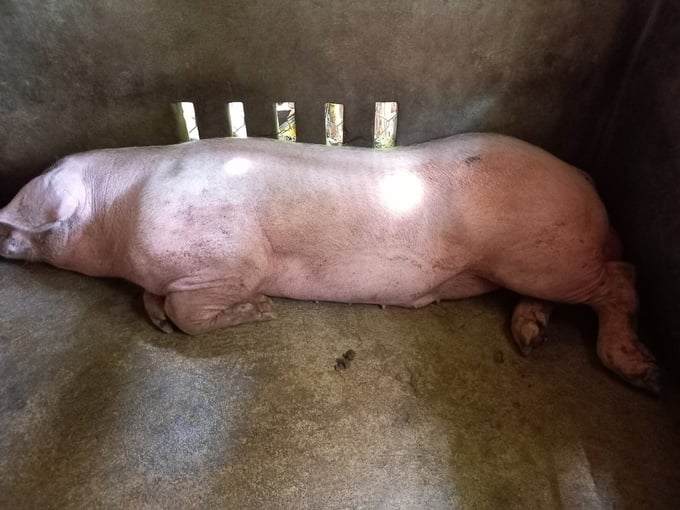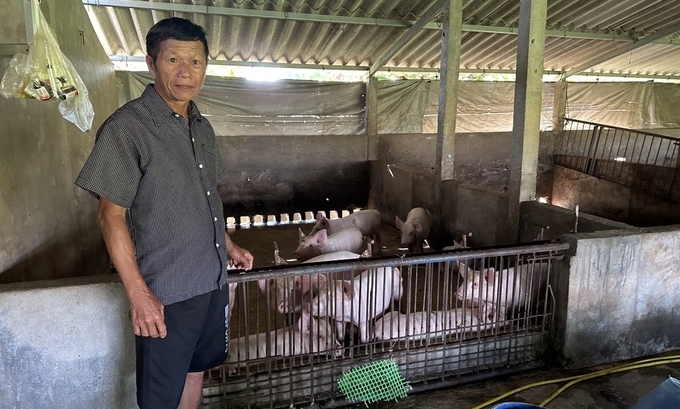May 21, 2025 | 02:57 GMT +7
May 21, 2025 | 02:57 GMT +7
Hotline: 0913.378.918
May 21, 2025 | 02:57 GMT +7
Hotline: 0913.378.918

African swine fever often recurs in Quang Ngai province, especially in small farming households. Photo: L.K.
In 2019, African swine fever first appeared in Vietnam and then spread to many provinces and cities nationwide, causing severe damage to many livestock households and farms. In Quang Ngai, in 2019, this disease occurred in 12 districts, 422 villages, and 119 communes, with more than 7,300 households with infected pigs. The total number of pigs destroyed is nearly 36,400.
After the outbreak of the disease, the local government of this province made efforts to suppress the epidemic, control its spread, and strengthen the disinfection and disinfection of infected barns, farms, and livestock farms.
In the past four years, livestock farming activities, especially pig farming in Quang Ngai province, have been less effective. In addition to the impact of the epidemic causing farmers to lack capital and the economy to be affected, high input costs and unstable output have discouraged many households and are hesitant to continue reherd.
Previously, the barn of Mrs. Nguyen Thi Nhan's family (residing in Dai An Dong 1 village, Hanh Thuan commune, Nghia Hanh district, Quang Ngai) always maintained more than 20 sows and pigs. However, in 2 years (2021 and 2022), African swine fever occurred, causing all the pigs in the barn to die and be mass-culled, leaving the family in a dire situation.
Mrs. Nhan said that in her decades of raising livestock, she has never seen difficulties like in recent years. After two consecutive epidemics, Mrs. Nhan left the cage for nearly 5 months and only decided to invest in raising it again at the beginning of this year (2023). "Now, I don't dare raise as many as before. I only release a dozen or so. While raising pigs, I'm also afraid of epidemics. In the past few years, raising pigs has suffered heavy losses. I don't know if this generation will be able to recover any capital," Mrs. Nhan shared.
The fact that farmers are not bold enough to re-herd or re-herd in smaller numbers than before is shown by the number of total pig herds in some localities in Quang Ngai province, showing signs of a sharp decrease. According to statistics from the authorities in Nghia Thang commune (Tu Nghia district), if the number of pigs in the entire commune in 2021 was 15,000, by the first 8 months of 2023, there are nearly 7,600 pigs.

Many livestock households try to regenerate their herds, but the number of herds is not as large as before. Photo: L.K.
“After the pig died from the epidemic, I wanted to invest in raising it again, but I didn't have the capital. It wasn't until two years later that my family received nearly VND 300 million in support to buy breeding pigs to raise again. The process of completing paperwork and receiving support takes too long. Therefore, for livestock households like us, we hope that the functional branches will pay more attention and provide faster and more timely support to restore production and livestock production soon," Mr. Lien confided.
According to Mr. Nguyen Lien (residing in An Cu village, Nghia Thang commune, Tu Nghia), after being affected by African swine fever in 2021, causing his family to lose about VND 1.6 billion, it will not be until early 2023. he dared to play again. However, the number of pigs raised this time is only more than half compared to before. The family's late resumption of the herd was due to a lack of investment capital when many of the assets previously invested in the pig farm were lost.
In Tinh Son commune (Son Tinh district), Ms. Nguyen Thi Thuy Trang, animal husbandry and veterinary officer of Tinh Son commune, also cited evidence that the number of pigs in the area is significantly decreasing than before. If in previous years, every day, this female veterinary officer had to be busy with professional activities such as vaccination and health care for mother pigs and piglets... now the density has also decreased by half.
"In addition to the continuous epidemics and economic losses for householders, there are other reasons why people do not want to develop livestock farming anymore. Among them, animal feed prices have increased 1.5 times higher than before. Meanwhile, the price of commercial pigs is also unstable, so there is no profit. Only profit is made from work.
In the commune, farmers have now significantly reduced the number of pigs for meat. As for sows, they used to keep 4 to 5 sows, but now they only keep 1 to 2 sows. However, the price of pig breeds sold has also decreased sharply. About 5 to 6 years ago, the price of a pig was around VND 1 million. Now, it is only VND 500,000 - 700,000/head. This reality shows that pig farmers have faced many difficulties in recent years," Mrs. Trang shared.
Translated by Tuan Huy

(VAN) In 2024, over 295 million people across 53 countries and territories faced acute hunger—an increase of almost 14 million people compared to 2023, while the number of people facing catastrophic levels of hunger reached a record high.

(VAN) World Environment Day 2025 (June 5) carries the theme 'Beat Plastic Pollution' continuing to emphasize the global urgency of addressing the plastic waste crisis.

(VAN) This was the assessment shared by experts at the workshop titled 'Assessing the Role and Potential of Low-Emission Rice Production Systems in Vietnam,' held on the morning of May 19.

(VAN) Cai Rong Port is the fisheries control center of Quang Ninh, helping to monitor fishing vessels, combat IUU fishing, and remove the EC's 'yellow card'.

(VAN) The German Agricultural Society (DLG) explores the possibility of establishing a mechanization service center in Vietnam’s Mekong Delta to support farmers in accessing and utilizing advanced machinery.

(VAN) On May 16, the Department of Water Resources Management, in collaboration with the Food and Agriculture Organization of the United Nations (FAO), held a signing ceremony for the GEF-8 project document.

(VAN) Food safety, mechanization, vocational training, and market opening are key areas of cooperation expected between the Vietnamese Government and the Federal Republic of Germany.